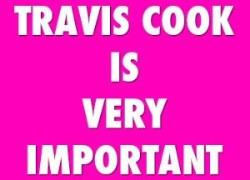
We need to make this clear: you have probably not heard of Travis Cook. A lot of people have not heard of Travis Cook. His fame is a self-fulfilling prophecy. His talk presents Travis as someone who is famous (even though he technically isn’t). By doing the Fringe show and convincing people he is popular, it’s likely his fame will actually occur. His Fringe show, How to Become Travis Cook represents this very interesting dynamic in the form of a comedic ‘self-help’ talk.
In an hour, Travis performs a series of self-aware truisms about fame, the city of Adelaide, and the competitive world of cyber punk. It’s hard to gauge sometimes whether this is a comedic performance or whether Travis well and truly believes he is the voice of his generation. There’s a bite to his voice and he clearly lives what he speaks – it’s just uncertain whether what he speaks about is as aspirational as he thinks it is.
Travis’s delivery is everything, and he exists as a walking, talking critique of the ridiculousness bourgeois culture. Travis celebrates the hilariously mundane: flying with Virgin Australia instead of Jetstar, shopping at north park centre (but treating it like Beverly Hills), and the pleasures of sauntering down Rundle Mall. From Travis’s perspective, the everyday is as exciting as the idea of fame, as long as we possess the insight and the ego. The power of celebrity is accessible within us – glamour has nothing to do with wealth.
Travis Cook understands self-branding. His talk gives some insight about how we can turn ourselves into our very own products, ready to be consumed and observed by the public. He talks about how much he loves the Internet, and how he loves the quirky, less threatening side of capitalism. In his talk, he emphasises especially how much this new wave self-parody is actually his biggest strength. His argument is that there is no choice but to live in this nonsensical world, so you might as well attack it from the inside out. His achievements include being followed by Molly Soda on Tumblr and working with a slew of likeminded Internet musical artists like Oscar Key Sung and HTMLflowers.
Watching Travis talk begs the question: “Where do the jokes end and where does reality begin?” It’s just too hard to say. The talk was nonetheless very funny, and surprisingly informative. At over an hour long however, it begins to drag, but this can only be expected for someone who has never actually given a legitimate self-help talk before.

